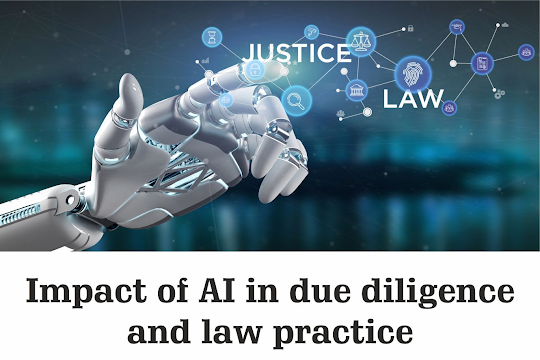AI in due diligence
Unlocking Efficiency and Precision: AI in Due Diligence for Business Projects
Introduction
In today's fast-paced business environment, due diligence plays a crucial role in mitigating risks and ensuring the success of projects. With the advent of artificial intelligence (AI), due diligence processes have undergone a significant transformation, enabling organizations to conduct thorough assessments with unprecedented efficiency and precision. This article explores the applications of AI in due diligence, focusing on its role in enhancing business diligence for AI projects.
The Evolution of Due Diligence in the AI Era
Due diligence, traditionally a manual and time-consuming process, involves the comprehensive assessment of various factors, including financial, legal, operational, and strategic aspects, to evaluate the viability and potential risks associated with a business project. However, the proliferation of data and the complexity of modern business landscapes have necessitated more sophisticated approaches to due diligence.
AI in due diligence has emerged as a game-changer , offering advanced analytical capabilities that streamline due diligence processes and unlock valuable insights. By leveraging machine learning algorithms, natural language processing (NLP), and predictive analytics, organizations can conduct faster, more comprehensive due diligence assessments, thereby reducing the time and resources required for thorough analysis.
AI in Due Diligence: Key Applications and Benefits
1. Automated Data Analysis:
- AI-powered tools can analyze vast volumes of structured and unstructured data, including financial reports, legal documents, market research, and social media sentiment analysis, to extract relevant insights efficiently.
- By automating data analysis processes, AI enables faster identification of potential risks and opportunities, allowing organizations to make well-informed decisions with greater confidence.
2. Risk Identification and Mitigation:
- Machine learning algorithms can identify patterns and anomalies within data sets, flagging potential risks such as financial irregularities, compliance violations, or operational inefficiencies.
- Through predictive analytics, AI can assess the likelihood of future risks and help organizations develop proactive mitigation strategies to safeguard their investments and reputation.
3. Enhanced Decision-Making:
- AI-driven due diligence platforms provide stakeholders with actionable intelligence, empowering them to assess the feasibility and potential outcomes of business projects more accurately.
- By synthesizing vast amounts of data into digestible insights, AI facilitates informed decision-making, enabling organizations to capitalize on opportunities while mitigating risks effectively.
Business Diligence for AI Projects: Special Considerations
AI projects, characterized by their reliance on advanced technologies and complex algorithms, require specialized due diligence processes tailored to address unique considerations. Business diligence for AI projects encompasses the following key aspects:
1. Algorithmic Transparency and Interpretability:
- Given the opacity of many AI algorithms, it is essential to ensure transparency and interpretability to understand how decisions are made and assess potential biases or ethical implications.
- AI due diligence should focus on evaluating the robustness, fairness, and reliability of AI models, as well as their compliance with regulatory requirements and industry standards.
2. Data Quality and Governance:
- High-quality data is critical for the success of AI projects, as algorithms rely on accurate and representative data sets for training and validation.
- Due diligence efforts should assess the integrity, relevance, and provenance of data sources, as well as the adequacy of data governance practices to ensure compliance with data privacy and security regulations.
3. Legal and Ethical Considerations:
- AI due diligence should address legal and ethical concerns related to intellectual property rights, data privacy, liability, and potential societal impacts.
- Organizations must conduct thorough assessments of the legal and regulatory landscape governing AI technologies, including emerging frameworks for AI ethics and governance.
Conclusion
AI has revolutionized due diligence practices, offering unprecedented capabilities to assess risks, identify opportunities, and support informed decision-making in business projects. By harnessing the power of AI-driven analytics, organizations can conduct more efficient and comprehensive due diligence assessments, particularly for AI projects, where specialized considerations are paramount. As AI continues to evolve, its integration into due diligence processes will play an increasingly critical role in driving business success and resilience in an ever-changing landscape.




Comments
Post a Comment